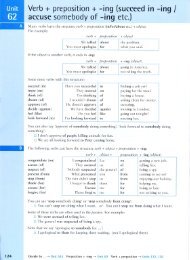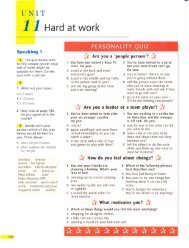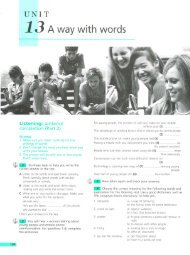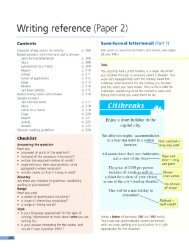You also want an ePaper? Increase the reach of your titles
YUMPU automatically turns print PDFs into web optimized ePapers that Google loves.
PAPE R 1<br />
Reading (1 hour 1 5 minutes)<br />
You are going to read a magazine article about a woman who works for the film industry.<br />
Choose the most suitable heading from the list A-lfor each part 1-7 <strong>of</strong> the article.<br />
There is one extra heading which you do not need to use. There is an example at the<br />
beginning (0).<br />
Mark your answers on the separate answer sheet.<br />
A lnitial career move<br />
B The purpose <strong>of</strong> an<br />
audition<br />
C Huge effort to attend<br />
auditions<br />
D Determination is<br />
essential<br />
E Looking good on the<br />
SCreen<br />
F Choosing an alternative<br />
career<br />
G Chance <strong>of</strong> stardom in<br />
future<br />
H Turning down<br />
promising actors<br />
I The pressures in holding<br />
auditions<br />
<strong>My</strong> <strong>Kind</strong> <strong>of</strong> <strong>Life</strong><br />
Fiona Bartlett is a talent scout for a film company.<br />
It is her job to find the right faces for the right film.<br />
She has spent the last month se/ecting the final cast<br />
for a new soap opera for teenagers,<br />
0 B<br />
I studied Theatre Arts at university and had intended to end<br />
up working as a stage manager in a theatre. However, during<br />
one summer holiday I did some voluntary work with a<br />
children's theatre group and I met a number <strong>of</strong> casting agents<br />
-<br />
any new production. They do this by holding auditions -<br />
which are rather like interviews -where they can assess a<br />
child's acting ability.<br />
I<br />
people whosejob it is to look for children to take part in<br />
It was fascinating sitting in on the auditions. Children whom I<br />
thought were brilliant, who could sing and dance and had such<br />
confidence were not always the ones who got the parts. The<br />
casting agents would explain that one <strong>of</strong> the things they were<br />
looking for was how photogenic the child would appear in<br />
front <strong>of</strong> the camera, so each audition is videoed and watched<br />
on a monitor at the same time as the child is performing live.<br />
Three people usually sat in on each audition and the director<br />
made the final decision. The schedule was always very tight<br />
and auditions were held in a different place each day for a<br />
period <strong>of</strong> up to two weeks at a time. So they were constantly<br />
on the move and might audition up to a hundred young<br />
hopefuls in one day. I spent two days accompanying children<br />
to these auditions, and it was that experience that attracted<br />
me to the pr<strong>of</strong>ession.<br />
3<br />
However, when I first left university I worked as a personal<br />
assistant to the Production Manager <strong>of</strong> a children's animation<br />
and cartoon company. It was my job to look after his diary,<br />
arrange meetings, book actors and musicians for recording<br />
sessions and so on and in that way I met hundreds <strong>of</strong> different<br />
people. Then one day I heard that a TV company was looking for<br />
a casting agent and I applied for and got the job.<br />
I was prepared for the hard work and the travel but one thing<br />
that I was completely unprepared for was the emotional strain <strong>of</strong><br />
the job. You arrive at the hall where the auditions are being held<br />
to be greeted by hundreds <strong>of</strong> young people all desperate to be<br />
chosen. And sometimes, however good they are, they are simply<br />
not right for the part, so you end up disappointing the vast<br />
majority <strong>of</strong> these kids.<br />
Obviously they've all worked and rehearsed enormously hard to<br />
get as far as the first audition. Most <strong>of</strong> them are accompanied by<br />
their teachers or a parent, they may have travelled miles to reach<br />
the place on time and spent money on fares and new clothes and<br />
so on. And they've got probably no more than five minutes to<br />
show us what they can do. Some <strong>of</strong> them are so nervous they just<br />
freeze, others are over-confident and burst into tears when you<br />
have to tell them they are not what you're looking for.<br />
s<br />
In an ideal world you'd like to be able to <strong>of</strong>fer everyone a job.<br />
But it is a very competitive world and if you can't survive these<br />
knocks early on when you're still a teenager, the chances are<br />
you've picked the wrong pr<strong>of</strong>ession. But if you believe in yourself<br />
and you can cope with these setbacks, it is worth auditioning over<br />
and over again. Sometimes people wait years before they get<br />
through an audition and there are no guarantees that you'll<br />
succeed in this business.<br />
But on the positive side there's enormous job satisfaction to be<br />
gained from choosing the right actors for a new production. I<br />
know that all the hours I've spent this last month will have been<br />
worth it when the first episode <strong>of</strong> this new soap is broadcast, and<br />
perhaps some <strong>of</strong> these new young faces will go on to become big<br />
names in the years ahead.<br />
TEST 4, PAPER 1<br />
E
You are going to read a magazine article about a businessman. For Questions 8-'14,<br />
choose the correct answer A, B, C or D.<br />
Mark your answers on the separate answer sheet.<br />
In 1989 a young, intrepid Australian was<br />
travelling around Europe and found<br />
himself at his British hotel after closing<br />
time - at 10 in the morning. Whilst most<br />
<strong>of</strong> us might take this as an opportunity to<br />
find a cosy bed and breakfast or at least a<br />
dry bench in a railway station, Matt<br />
Lassiter spotted a business opportunity.<br />
Knowing that he was not alone and that<br />
thousands <strong>of</strong> backpacking youngsters were<br />
wandering the world with heavy bags and<br />
fat wallets, Lassiter came up with a plan<br />
to start his own hostels that made young<br />
visitors feel at home whenever they<br />
arrived. 'I realised there was not so much<br />
a gap in the backpackers'market, but<br />
rather a canyon!'<br />
A couple <strong>of</strong> years later, Lassiter formed<br />
his own company which he called<br />
Roamers. His intention was to focus on<br />
creating hostels which would provide<br />
accommodation for the dynamic youth<br />
tourism market. 'The average backpacker,<br />
around 18-2'1., is likely to be highly<br />
educated, <strong>of</strong>ten taking time <strong>of</strong>f between<br />
school and university and usually has<br />
quite a lot <strong>of</strong> money to spend and these<br />
are the people Roamers sets out to<br />
attract,' says Lassiter.<br />
Today, Roamers operates in more than20<br />
countries, has 70 hostels and provides L.5<br />
million bed nights each year. Lassiter says<br />
that each hostel is like a kindly aunt or<br />
uncle looking after young people.<br />
Backpackers like that and their parents 3s<br />
like it even more, not because Roamers is<br />
a fun environment, but because Roamers<br />
<strong>of</strong>fers a safe and secure form <strong>of</strong><br />
accommodation.<br />
A typical hostel has showers and toilets<br />
on each floor, a'chill out' room with<br />
television, food, bar and drinks facilities, a<br />
laundry room and internet access with<br />
free e-mail usage. Lassiter was very aware<br />
that his young, bright customers would all<br />
be familiar with the internet and that it<br />
would play an important part in<br />
marketing his company.<br />
Part <strong>of</strong> Lassiter's success is knowing that<br />
backpackers want to feel like explorers.<br />
'We have to be very careful how we<br />
market our products - it must be their<br />
decision and not seen as a package<br />
holiday - we make them think they are<br />
independent.' The Roamers technique is<br />
to <strong>of</strong>fer pre-booked two or four-day tours,<br />
a couple <strong>of</strong> nights recovering from jetJag,<br />
a welcome pack, clean sheets - no<br />
sleeping bags -and a free call home. The<br />
formula is certainly working, which just<br />
goes to show that Lassiter's instincts are<br />
exactly right for this growing holiday<br />
market.<br />
@ TEST 4, PAPER 1
O nI?'$;S tslry*rftSl'<br />
at how the information,<br />
,wlllle not rtated *$ g*qhi '<br />
is clearly imptied.<br />
Qdhl ll: Loo* back to<br />
the prwious sentgnce.<br />
Pay carefuIattention to<br />
I thr,w$rd ilks', , ;, '.$l;'ii<br />
Qnffitr3l Lookatthe<br />
fourth paragraph <strong>of</strong>the<br />
: tutt. Whal dos$ !L{s${f€r ;, ,<br />
was very aware'suggest?<br />
How did Matt Lassiter react to the British hostel closing in the morning?<br />
A He looked for alternative accommodation.<br />
B He decided to continue his journey.<br />
C lt put him <strong>of</strong>f travelling in Europe.<br />
D lt gave him an idea for the future.<br />
9 What did Lassiter think would help young travellers?<br />
A to be less spoilt financially by their parents<br />
B to be more aware <strong>of</strong> looking after their money<br />
C to accept that accommodation can vary<br />
D to find more welcoming accommodation<br />
10<br />
Roamers hostels are designed for young people who<br />
A are studying part-time.<br />
B have freedom and leisure.<br />
C are living on a small budget.<br />
D have an interest in marketing.<br />
11<br />
What does 'that' in line 35 refer to?<br />
A the hostels' caring attitudes<br />
B hostels run by relatives<br />
C the hostels' generous facilities<br />
D hostels available worldwide<br />
12<br />
Why are parents in favour <strong>of</strong> Roamers?<br />
A They can pay extra for secure arrangements.<br />
B They approve <strong>of</strong> the entertainment on <strong>of</strong>fer.<br />
C They don't worry about their children's safety.<br />
D They like the fact that their children have fun.<br />
13<br />
Lassiter's use <strong>of</strong> the internet<br />
A saves him time and money.<br />
B shows good business sense.<br />
C attracts business partners.<br />
D helps him market computers.<br />
14 Lassiter is successful because<br />
A<br />
.B<br />
€<br />
D.<br />
he has researched his market.<br />
he operates a very fair formula.<br />
travellers can depend on his advice.<br />
explorers benefit from his hostels.<br />
TEST 4, PAPER 1<br />
E
You are going to read an article about a woman pilot. Eight sentences have been removed<br />
from the article. Choose from the sentences A-lthe one which fits each gap (15-21).<br />
There is one extra sentence which you do not need to use. There is an example at the<br />
beginning (0).<br />
Mark your answers on the separate answer sheet.<br />
FLYING INTO THE RECORD BOOKS<br />
Polly Vacher is no ordinary woman pllot. [O T--7__l<br />
llTl--__-l<br />
lt ended only three days behind schedule when she landed her Piper Dakota at Birmingham<br />
in central England in May, five months later,<br />
mT----__l<br />
This included storms and a cyclone in Fiji, a country in the South Pacific Ocean. Nor was the<br />
journey without incident for Polly, who only learned to fly at the age <strong>of</strong> forty-nine.<br />
One <strong>of</strong> the trip's most frightening moments came, worryingly, on the same route where Amelia Earhart, the<br />
American pilot, went missing when she was attempting to fly around the world in 1937. [li?"l--l<br />
ln fact, she allowed herself to be photographed as she stood beside a Banyan tree, which Amelia Earhart had<br />
planted in 1935, before setting <strong>of</strong>fforthe 16-hoursection <strong>of</strong> herflightfrom Hawaiito California.<br />
Then suddenly it started to<br />
According to Polly all went well for the first part <strong>of</strong> her journey.<br />
[I-TT--_-]<br />
get very bumpy. Checking the outside air temperature Polly discovered it was zero degrees. To her horror she<br />
found streams <strong>of</strong> ice-cold rain running back along the wrngs and startirig to freeze. m-__--]<br />
Though Polly immediately dropped her height to prevent the weight <strong>of</strong> ice pulling her plane into the ocean,<br />
there was more drama when the cabin suddenly went quiet.<br />
As a result the main tank had<br />
run dry an hour early, but fortunately the emergency tank went into action and she was able to land safely.<br />
The lonely hours spent flying were a great contrast to the warm welcome she received wherever she landed.<br />
1r<br />
for disabled people.<br />
to<br />
The publicity she attracted also raised money for a charity which provides flying scholarships<br />
@ TEST 4, PAPER 1
A Pollys 46,000km record-breaking journey began in January.<br />
B This is the most dangerous kind <strong>of</strong> ice as it is difficult to see it forming.<br />
C Polly, however, was determined not to let what had happened in the past cause<br />
her anxiety.<br />
D Strong winds meant that she had used more fuel than expected.<br />
E Up there in the sky you are completely free.<br />
F The delay was the result <strong>of</strong> uncooperative weather.<br />
G There was tremendous media interest and on one occasion she gave up to seven<br />
interviews in a single day.<br />
H The moon and the stars appeared and she even had time to do some sewing.<br />
I ln 200'l she flew to the ends <strong>of</strong> the Earth and into the record books by becoming<br />
the first woman to fly the smallest aircraft around the world via Australia and the<br />
Pacific.<br />
,rl .1)itl:l,J'ill- -<br />
TEST 4, PAPER 1 E
You are going to read about four countries that <strong>of</strong>fer work experience opportunities for<br />
young people. For Questions22-35, choose from the countries (A-O). The countrtes may<br />
be chosen more than once. When more than one answer is required, these may be given<br />
in any order. There is an example at the beginning (0).<br />
Mark your answers on the separate answer sheet.<br />
Which <strong>of</strong> the countries<br />
makes special mention <strong>of</strong> its city-based projects?<br />
<strong>of</strong>fers different types <strong>of</strong> schools?<br />
has a European feel to it?<br />
will accept you directly into the community?<br />
can rely on parental support for its educatton programme?<br />
would you choose if you want to work with<br />
pre-school-age children?<br />
<strong>of</strong>fers a variety <strong>of</strong> sporting activities?<br />
is recommended for its shopping?<br />
is benefiting from its own people's experience abroad?<br />
might require.you to learn a local language?<br />
gives you a choice <strong>of</strong> accommodation?<br />
would appeal to someone who doesn't eat meat?<br />
suggests that it <strong>of</strong>fers unique opportunities?<br />
<strong>of</strong>fers a stimulating classroom atmosphere?<br />
r. l-E<br />
[&l---t<br />
m-l<br />
IFT-_-]<br />
f[TI__l<br />
[26] I<br />
ffir-l<br />
ffiT-_l<br />
TF9'T-]<br />
[$T-_l<br />
rFI---,<br />
tffi__l<br />
mr-_-l<br />
@ TEST 4, PAPER 1
;li(|<br />
a,<br />
I<br />
Q<br />
a D<br />
D<br />
I<br />
ILI D<br />
Magical India is a land <strong>of</strong> many contrasts. It is impossible<br />
to generalise about this subcontinent and everyone has a<br />
different experience and different opinions. To live in<br />
India is to be part <strong>of</strong> a way <strong>of</strong> life totally unlike anything<br />
else.<br />
People who volunteer to work in India spend up to six<br />
months at a time in the south <strong>of</strong> India. It's an area with a<br />
special feel to it - the villages and farms feed local<br />
people well, while the temples, sometimes built on great<br />
rocks overlooking the plain, satisfy people's spiritual<br />
needs.<br />
South Indian community life is very close; if you work<br />
there you will be treated as an addition to any school or<br />
family that you join. The food is famous for its variety <strong>of</strong><br />
spices, vegetables and fruit and many people are<br />
vegetarians.<br />
You will find yourself helping with both primary and<br />
secondary schoolchildren. Some schools also have<br />
children as young as nursery age, and you may well have<br />
the chance to work with them as well.<br />
Travelliqg in India <strong>of</strong>fers great opportunities. The rainy<br />
seasons in June and July and October keep the climate<br />
cooler, and do not interfere with daily life.<br />
Ghana is a colourful country <strong>of</strong> thick tropical forests, wild<br />
savannah or bush and great beaches. It is home to one <strong>of</strong><br />
Africa's friendliest and most welcoming people. The<br />
Ashanti built their kingdom on Ghana's gold - their<br />
country used to be called the Gold Coast. Modern<br />
Ghanaian culture is open and varied.<br />
In recent years Ghana has attracted new money, and<br />
many Ghanaians have returned home from working or<br />
studying abroad bringing new investments and ideas with<br />
them.<br />
In Ghana people attach great importance to social and<br />
community events and many people are deeply religious.<br />
The <strong>of</strong>ficial language is English but the main spoken<br />
languages are Ewe, Twi and Ga.<br />
Children and their parents see education as a way to<br />
better jobs and good lives and children work hard at<br />
school. If you are working with young children in a<br />
primary school, you will find that teaching lively songs<br />
and rhymes is very popular.<br />
Travelling around is cheap. Local minibuses, buses and<br />
trains operate throughout most <strong>of</strong> the country and<br />
wherever you go you will be given a warm welcome.<br />
If you choose to work in Nepal, you will find a wellestablished<br />
programme for volunteers, particularly in<br />
the capital Kathmandu.<br />
You will be <strong>of</strong>fered opportunities in schools both in and<br />
around the city, ranging from well-equipped<br />
independent and state schools to much smaller ones set<br />
up to help children who, without an education, would<br />
have no future.<br />
Volunteers spend up to six months at a time working<br />
with children from the ages <strong>of</strong> five to seventeen. You<br />
have a choice <strong>of</strong> working in busy Kathmandu, one <strong>of</strong> the<br />
villages in Kathmandu Valley or in the peaceful town <strong>of</strong><br />
Pokara at the base <strong>of</strong> the great Annapurna mountain<br />
range by the shores <strong>of</strong> the beautiful Phewa Lake.<br />
Accommodation is either with host families or local<br />
hostels.<br />
The surrounding countryside is excellent for walking and<br />
climbing, boating on the lake, and white-water rafting in<br />
the mountain rivers.<br />
Togo in West Africa is situated between Ghana and<br />
Benin. The capital city, Lome, is on the coast close to<br />
the Ghanaian border.<br />
Togo's <strong>of</strong>ficial language is French and although Togo<br />
has been independent since 1960 the French influence is<br />
still evident, from the architecture to the food.<br />
Lome is said to have the best market in West Africa and<br />
the Togolese are warm and hospitable people.<br />
Accommodation is cheap; you can choose to stay with a<br />
host family or you may prefer to find your own room or<br />
apartment.<br />
The south <strong>of</strong> the country is flat with lagoons along the<br />
length <strong>of</strong> the coast, but as you travel north the land<br />
becomes hilly and rich with c<strong>of</strong>fee plantations.<br />
We can <strong>of</strong>fer you work opportunities in secondary<br />
schools where the classes range in age from ll-20.<br />
TEST 4, PAPER 1<br />
EI


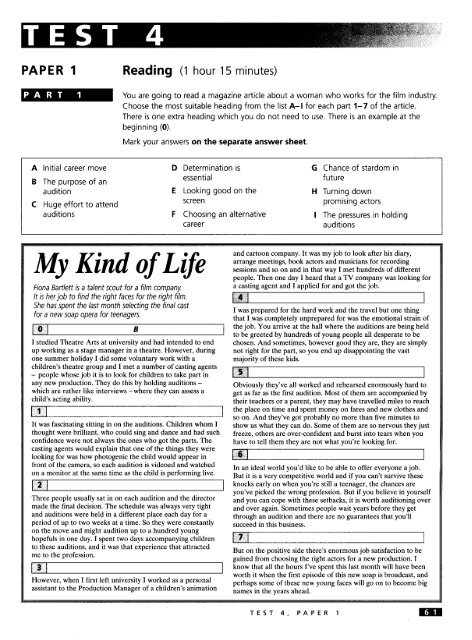

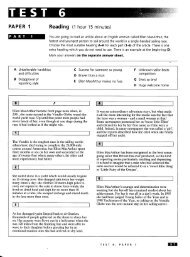
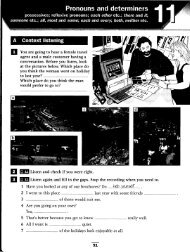
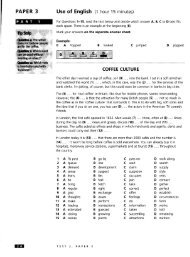
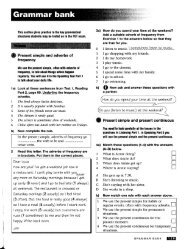
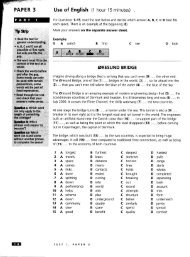
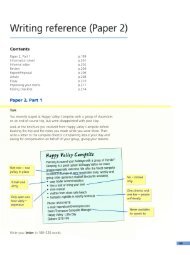


![T]NIT 9 A new look](https://img.yumpu.com/40125756/1/190x248/tnit-9-a-new-look.jpg?quality=85)
